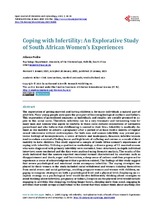| dc.contributor.author | Pedro, Athena | |
| dc.date.accessioned | 2018-09-18T08:32:57Z | |
| dc.date.available | 2018-09-18T08:32:57Z | |
| dc.date.issued | 2015 | |
| dc.identifier.citation | Pedro, A. (2015). Coping with infertility: An explorative study of South African women’s experiences. Open Journal of Obstetrics and Gynecology, 5: 49-59 | en_US |
| dc.identifier.issn | 2160-8792 | |
| dc.identifier.uri | http://dx.doi.org/10.4236/ojog.2015.51008 | |
| dc.identifier.uri | http://hdl.handle.net/10566/4053 | |
| dc.description.abstract | The expectation of getting married and having children is for many individuals a natural part of
adult life. Many young people anticipate the prospect of becoming biological mothers and fathers.
This expectation of parenthood emanates as individuals and couples are socially groomed to aspire
to this social norm. Therefore, infertility can be a very traumatic and tormenting time for
many men and women who aspire to conform to these socio-cultural conventions of normative
parenthood and who believe that childbearing is central to their lives. Infertility is medically defined
as the inability to achieve a pregnancy after a period of at least twelve months of regular
sexual intercourse without contraception. For both men and women infertility may present pervasive
feelings of incompleteness, a sense of failure and inadequacy. However, infertile women
tend to endure a myriad of feeling losses and high levels of suffering and sorrow as a result of their
inability to have children. This study explored a sample of South Africa women’s experiences of
coping with infertility. Utilising a qualitative methodology, a diverse group of 21 married women
who were diagnosed with primary infertility were recruited. Semi-structured, in-depth individual
interviews were conducted and the data were analysed using thematic analysis. The results of the
study indicated that the women reported emotional turmoil characterised by emotions such as
disappointment and shock, anger and frustration, a deep sense of sadness and then progressed to
experience a sense of acknowledgement that a problem existed. The findings of this study suggest
that severe psychological and emotional strain accompany infertility. The coping strategies employed
by these women in the study included social withdrawal and women isolating themselves
from social events and social gatherings, avoiding pregnant women and women with children, engaging
in escapism strategies on both a psychological level and a physical level. Employing an escapism
strategy on a psychological level would involve deliberately thinking about strategies to
avoid thinking about infertility, pregnancy or babies. Escapism on the physical level would include
engaging in activities like shopping, working longer hours, sleeping more than usual, engaging in
activities that would occupy an individual to the extent that they cannot think about anything else except the activities they are currently engaged in. | en_US |
| dc.language.iso | en | en_US |
| dc.publisher | Scientific Research Publishing | en_US |
| dc.rights | Copyright © 2015 by author and Scientific Research Publishing Inc.
This work is licensed under the Creative Commons Attribution International License (CC BY).
http://creativecommons.org/licenses/by/4.0/ | |
| dc.subject | Infertility | en_US |
| dc.subject | Psychological and emotional trauma | en_US |
| dc.subject | Motherhood | en_US |
| dc.subject | Involuntary childlessness | en_US |
| dc.subject | Coping | en_US |
| dc.title | Coping with infertility: An explorative study of South African women’s experiences | en_US |
| dc.type | Article | en_US |
| dc.privacy.showsubmitter | FALSE | |
| dc.status.ispeerreviewed | TRUE | |
| dc.description.accreditation | ISI | |

